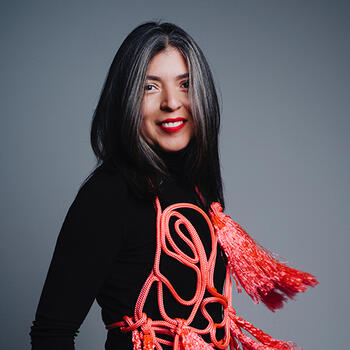Lisu Vega (b. Miami, 1980) is a multidisciplinary artist and a current member at the Miami-based Laundromat Art Space Residency Program. Her work explores the notion of memories through the allegory of “weaving”, both literally through the materials and metaphorically as a process. Trained as an experimental graphic designer with vast experience in the fashion industry, Vega is constantly bridging the gap between handmade and digital media. The ancient weaving knowledge from her Wayuu lineage has allowed Vega to define her artistic practice in terms of sustainability while exploring the relevance of traditional systems in a contemporary context. Her work has been exhibited throughout the United States, Europe and Latin America. Recent exhibition highlights include the renowned “Innovative Costume of the 21 century: The Next Generation” at the Bakhrushin Museum in Moscow. Vega currently lives and works in Miami, Florida and her work will be on view at the Coral Gables Museum, Florida in December 2019.
Statement
Lisu Vega is a multidisciplinary artist working with engraving, sculpture, installation, and fashion art. Her work explores ideas of sustainability, migration, memory, and identity.
Her commitment to the environment is central to her practice. She is constantly exploring recycled materials with the goal to achieve a zero-waste practice, while examining the relevance of traditional processes in the context of contemporary art.
Vega’s beginnings on experimental engraving opened for her the possibility of working on multiple materials, such as paper, fabric, and metal, becoming an incentive to move out of the canvas and going to tri-dimensional work. Also, her interest in better understanding her own identity led her to the exploration of the relationship between fiber and the human body, and to go beyond the body to the space that surrounds us.
She employs a myriad of mediums, materials, and techniques to work on the themes that interest her but weaving and her knowledge of its ancient techniques passed down through her Wayuu heritage, has become Vega’s preferred vehicle for expression and exploration of her own memories, identity, and her migration story. The intensive physical nature of the weaving work serves her as a catalyst to her feelings of loss for what has been inevitably left behind, simultaneously creating a bridge to her past and a strong message of hope for the future.


